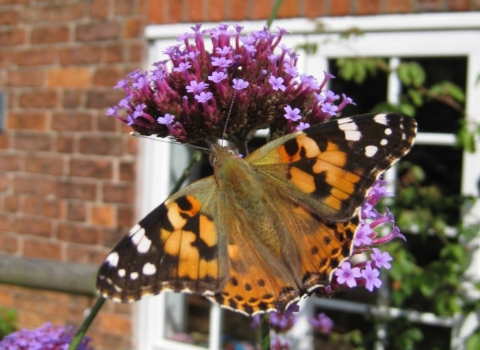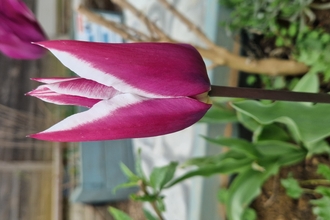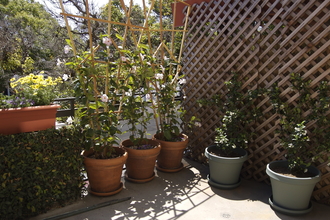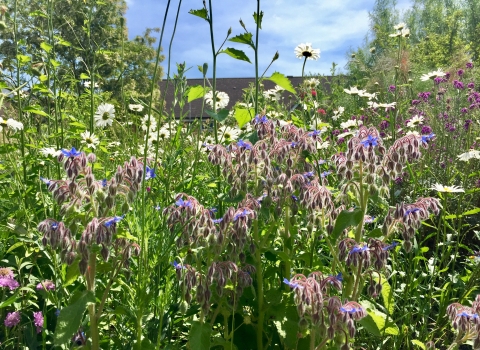Did you know that, on average, private gardens make up 20% of our cities? That's why they're so important, providing space for wildlife and forming links between larger green spaces to make wildlife corridors.
A garden or yard is a valuable home for wildlife by night and day, and is also a vital refuge for many kinds of wildlife. Anything we do to help, no matter how small, adds up to make a big difference for the future of native species.
Download your wild bee action pack
The pack contains everything you need to start learning more about how to help bees in your garden.
Your pack will include:
- A bee ID guide
- Fantastic bee facts
- Bee-friendly gardening tips and advice
- How to build you very own wild bee home
Wild about gardens
The Wildlife Trusts are a key partner in Wild About Gardens, along with the RHS.
This year we’re calling on gardeners across the country to help save hoverflies. This fly family is the second most significant pollinator after bees – some species of hoverfly are known to visit more flowers than bees. Download your free hoverfly gardening guide from our Wild About Gardens page.
More Wild About Gardens Guides...
- Gardening for Hedgehogs (https://www.wildlifebcn.org/sites/default/files/2020-02/WAG%202015%20Hedgehog%20Booklet.pdf)
- Gardening for Bats (https://www.wildlifebcn.org/sites/default/files/2020-02/WAG%202016%20Bat%20Booklet.pdf)
- Gardening for (and with) molluscs (https://www.wildlifebcn.org/sites/default/files/2024-03/WAG%202024%20-%20Making%20friends%20with%20molluscs.pdf)
- Creating a Wildlife Pond (https://www.wildlifebcn.org/sites/default/files/2020-02/WAG%202019%20Ponds%20Booklet.pdf)
- Gardening for Bees (https://www.wildlifebcn.org/sites/default/files/2020-02/WAG%202017%20Bee%20Booklet.pdf)
- Gardening for (and with!) Worms (https://www.wildlifebcn.org/sites/default/files/2020-02/WAG%202018%20Worms%20Booklet.pdf)
- Gardening for butterflies (https://www.wildaboutgardens.org.uk/sites/default/files/2020-12/Grow%20a%20secret%20garden%20for%20butterflies%2C%20Wild%20About%20Gardens%202020.pdf)
- Gardening for beetles (https://www.wildaboutgardens.org.uk/sites/default/files/2022-03/200204%20RSWT%20WAG2021%20Booklet_WEBSPREADS_ENGLISH.pdf)
- Gardening for swifts, swallows and martins (https://www.wildlifebcn.org/sites/default/files/2022-03/Swifts%2C%20Swallows%20and%20Martins%20%28High%20Fliers%29%20%282022%29.pdf)

WildNet - Adam Cormack
Wildlife Gardening Awards
Once your garden is wildlife-friendly, why not apply for a Wildlife Gardening Award? We’d love to receive applications from different types and sizes of garden in Beds, Cambs and Northants.
Whether you look after a garden at your home, in a community space, school, workplace, or care home, submit your application online and receive a digital certificate and digital wildlife garden themed booklet, plus the opportunity to purchase a plaque to proudly display in your wild space.
Wildlife gardening talks
Wildlife gardening blogs
Top tips and experiences from our staff and volunteers

Community Garden Updates: February 2025
Find out all about how we've kickstarted the new year at the Community Garden, including learning about and helping birds and…
Community Garden Updates: December 2024
Find out all about what we've been up to at the Community Garden at Rushden Lakes this Autumn, including October Half Term and…

Community Garden Updates: Summer 2024
Find out all about what we've been up to at the Community Garden at Rushden Lakes this summer and the exciting things we have…

May Highlights at the Community Garden at Rushden Lakes
Supporter Engagement and Communities Officer, Viktoria, gives us an update on all the community garden highlights in May

Community Garden Updates: May 2024
Supporter Engagement and Communities Officer, Viktoria, gives an update on our community garden at Rushden Lakes

Stem the sound
There are lots of ways we can employ the power of nature to reduce noise pollution around the home.




